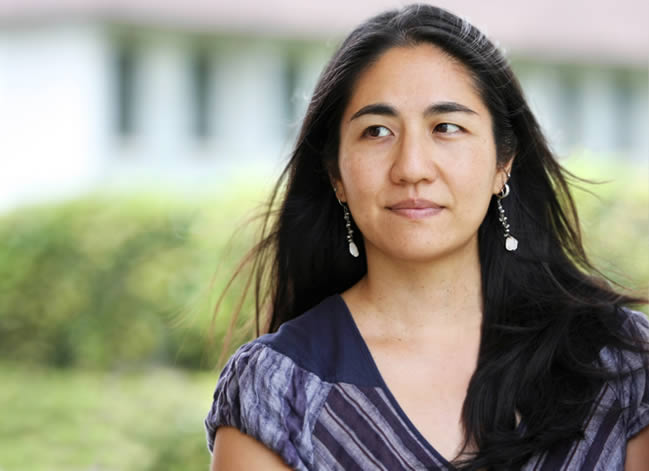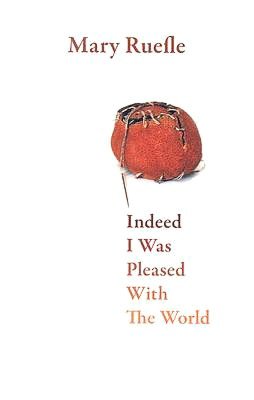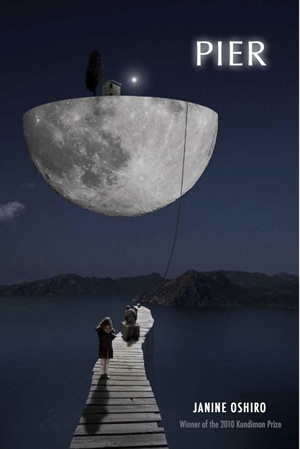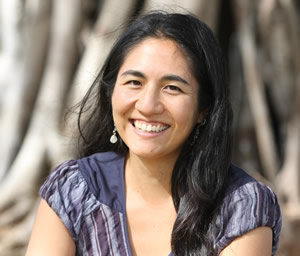Craft
Doubt in the Repetition:
Janine Oshiro on the Kundiman Prize
and Creating Her Own Givens

 ur winter 2010 issue featured poems from Janine Oshiro, a talented writer whose work we had known about for some time. We weren't surprised, then, when only weeks later Oshiro was named the winner of the first Kundiman Poetry Prize. Her first book, Pier, was published by Alice James Books in November 2011. Oshiro's friend and fellow poet Daneen Bergland recently asked her some questions about narrative, her experience of having a first book published, and the phrase "it is said." Oshiro was at her home in Hawaii; Bergland was in some liminal cyberspace.
ur winter 2010 issue featured poems from Janine Oshiro, a talented writer whose work we had known about for some time. We weren't surprised, then, when only weeks later Oshiro was named the winner of the first Kundiman Poetry Prize. Her first book, Pier, was published by Alice James Books in November 2011. Oshiro's friend and fellow poet Daneen Bergland recently asked her some questions about narrative, her experience of having a first book published, and the phrase "it is said." Oshiro was at her home in Hawaii; Bergland was in some liminal cyberspace.
PROPELLER: How or where do your poems start? Or if you like, where do you think your poems come from?
JANINE OSHIRO: I don’t think it’s right to say that they come from one place. I think there are these elements floating around: questions and concerns about the world, scraps of conversation, the news, day dreams and night dreams, word lists, anxiety, sadness, appreciation, vowel sounds, insistent rhythms, a hundred journal entries about the same thing, other people’s poems, especially other people’s poems. Those elements can float around—and nothing. Or they might be harnessed into a poem.
PROPELLER: Are there any poems (types? subjects? forms?) you wish you could write, but can't?
JANINE OSHIRO: Sometimes I read these poems sort of in the style of Dean Young, and they are so delightful and sad and cool and twisted. They jump around and can contain everything—small bunnies, Kierkegaard, colanders, childhood abandonment. I can’t seem to write a poem like that, but I admire poems like that and wish I could. I am also way too earnest to write a poem with hip irony.
PROPELLER: Ditto. I admire this in Young’s poems as well, though sometimes I mistrust it in others’ poetry. Sometimes it seems a little slippery, a little show-offy. I’m one of those people who loves to hang out with the smart alecks, but doesn’t actually want to be one myself. Too much effort to hide. I want something personal and emotional to be at stake in a poem, no hiding behind coolness. I love it when I catch one of my smart aleck friends being accidentally earnest. Do you have any favorite poets/books right now, hip and ironic, earnest, or otherwise?
 JANINE OSHIRO: Do you think most smart alecks are hiding something, or is that a teenage girl fantasy: there is something behind that smarty-pants surface, I know it! If only he/she would talk to me, I could unearth it!
JANINE OSHIRO: Do you think most smart alecks are hiding something, or is that a teenage girl fantasy: there is something behind that smarty-pants surface, I know it! If only he/she would talk to me, I could unearth it!
I am stuck reading the same books I was reading when I was in graduate school. I know I should move on and find out what is happening in contemporary poetry, but honestly, with so little time, I just want to read the poems that have moved me and keep moving me. I’ve been stuck on A.R. Ammons for several years. I brought him on my two most recent trips, and I usually keep him tucked into my pillow. I reread parts of Mary Ruefle’s Indeed I Was Pleased with the World a few days ago when I went to my eight-year-old friend’s piano recital. I just started reading Joanna Klink’s Raptus, a recommendation from Lucas Bernhardt, and so far I absolutely love her language. I took Sylvia Plath with me on a recent neighbor island trip. I am so not the person to ask for a book recommendation these days.
PROPELLER: Do you compose on paper? or on a computer?
JANINE OSHIRO: I jump around from paper to the computer and back again. Lately I am enjoying composing on the computer more. I used to like certain kinds of pens and notebooks, but now I don’t care. I’m trying not to buy pens. I want to reuse all the paper I already have. Now that I have boxes of old journals and drafts and whatnot, I like the idea of doing everything on the computer so I don’t add to my piles. Of course, I could just start feeling better about throwing stuff away.
I think you are better about throwing stuff away, yes? But journals? At least once a year I decide I should just burn all the old notebooks, but then I change my mind. I never look at them. I’m not particularly interested in reading about my life when I was in the 9th grade.
PROPELLER: Yes, I love to throw stuff away, and the accumulation of it is one of my greatest anxieties. Seriously. But I have hundreds of pages of old poem drafts lying in drawers and piled up in stacks. Those I like to cut up for grocery lists. But I would never throw away a journal (or a letter). I have such a terrible long term memory. These serve as my record, my external memory, I guess, even if I never look at them. It seems wrong to get rid of them, like I’m erasing one of my selves. Though I’ll admit I tried a few years ago to read a journal from a particularly painful part of my life and it was awful; I had to put it down almost immediately. Excruciating. But I like to revisit old letters. Sometimes I tuck an old junior high note from my best friend somewhere in a drawer so I can stumble upon it every so often and feel happy. I do, however, delete emails. Sometimes I think, oh no, Janine and I will never have our letters published into a beautiful book like Bishop and Lowell when we’re dead and gone because I deleted our emails.
I’ve always thought something different happens in your brain/body when you write with a pen and paper than when you type. Certainly the timing of your creativity is altered. Your brain had a little more time to flit around between words when handwriting. I notice that when I’m writing on the computer I can distract myself a bit more, though I don’t necessarily see this as a bad thing. Do you think there is a difference?
JANINE OSHIRO: Good idea! I wouldn’t mind accidentally stumbling upon a picture of Slash (from Guns N’ Roses) that my best friend drew in the ninth grade. I should tuck that into my knife drawer.
I have to admit—gasp!—that I cannot type without looking at the keys. I can get by, but no way am I a quick typist. It’s actually a little embarrassing. In my case, I don’t think timing is altered much at all.
PROPELLER: Do you write in lines, sentences, or metrically? Or?
JANINE OSHIRO: I guess I can say that I often write in chunks, and then the chunks start becoming lines. I have on occasion written with the goal of iambs, but usually it just happens. Sometimes I just write lists, and then something happens. Often I write a whole lot of junk and nothing really comes of it.
Recently I gave myself these exercises, but then I got sick of them. They were questions I had written as prompts. A poem can come from an exercise, true, but in this particular case, nothing much happened.
PROPELLER: Do you think teaching helps or hinders your writing? Or does it make a difference at all?
JANINE OSHIRO: Right now it is not helping my writing because teaching takes up so much time. I am like so many others, struggling to find a balance between the two. I am mainly around beginning writers, and the energy can be exciting at times. I recently stole a phrase from a student. He kept repeating “deity or deities” in his essay—to be fair. We don’t want to exclude any deities, if more than one exists! I used it in a poem.
PROPELLER: What are you looking from yourself when you write? In other words, what are you hoping to accomplish in a poem, and how do you know when you've succeeded?
JANINE OSHIRO: Have I succeeded? I don’t know. At a certain point, I felt as if I had learned all I could from writing the poems in the book. I was done.
 PROPELLER: Did anything surprise you about the process of having a book published?
PROPELLER: Did anything surprise you about the process of having a book published?
JANINE OSHIRO: I wanted a book. Sometimes I thought to myself there was nothing more in the world that I wanted. It was the only thing. My life was very difficult when I first moved back to Hawaii, and I thought if only I could win a book prize, then everything would be better. But then it happened. It was amazing, and I feel so incredibly honored that people are reading my book. But it didn’t solve all my problems or transform my life. Why did I ever think a book prize would change everything? It was writing the poems that helped me to transform my experience and see the world differently.
PROPELLER: To me getting a book published, let alone chosen for a book prize, seems like winning the lottery. I feel completely daunted at the prospect of trying sometimes to send my work out. Do you feel more confident about assembling a new manuscript now? Are you working on anything new? Are you thinking “book” or “poem” or just “words”?
JANINE OSHIRO: Everything feels new again. No confidence has been gained. I am definitely not thinking “book.” I am thinking more like can I even write five poems this year? I know some people think in terms of projects or poems about x. That hasn’t happened to me yet. I am struggling with just writing a poem. And then, hopefully, another poem.
PROPELLER: The poems in your book seem to have at least two distinct voices, one detached, scientific, and at times instructional, and another that is more earnest and emotional. Can you comment on these voices? Do you think of them as distinct? If so, what is their relationship to one another?
JANINE OSHIRO: Yes, they feel definitely distinct. Maybe they feel like different ways of approaching the same problem. I used found language in some of the poems, so that contributes to the voices. Found language can often be a trigger for me in the writing process.
PROPELLER: What place does narrative have in your poems? Do you think of yourself as a story writer?
JANINE OSHIRO: I am very interested in storytelling and narrative these days. I recently went to a performance of stories for grownups, stories about retirement and old age and death. I don’t think of myself as a storyteller or writer when I see what these performers do. I think there was more of a storytelling element in putting the individual poems together into a book—creating an arc for the reader to experience the poems as a whole.
I’ve been learning some stories and telling them when I do readings. I like having a different texture in the reading event. I’ve also tried to learn stories that I think relate to the poems in some way. Maybe it is also a bit of relief from the sadness of the poems. I did a reading where I teach, and after reading the poem “Next, Dust,” I noticed one of my students in the audience weeping, almost uncontrollably. I made a quick change of plans and followed that poem with a story, one whose message asks that we withhold judgment on whether something is good or bad. I was glad at that moment that I had a story ready. I think it was able to do something that one of my poems could not do.
But back to narrative, yes. I do think there is a narrative storytelling element in many of the poems. It’s one element among many. I’d like to push narrative a bit more, in fact.
I’m wondering if you asked me this because it seems in certain circles that narrative is not very interesting or almost at the other end of experimental. Maybe people often think of narrative poems as plain, conventional, or one-dimensional, but I don’t think that is necessarily the case. We don’t really know what is possible in a narrative poem until we try it. Can I say I’m trying to write an experimental-narrative poem? I’m trying to write an experimental-experimental poem? Even experimental poems start having conventions. The definition of a narrative poem can be closed off by every narrative poem that came before it, or it can keep evolving and changing as people play with all the possibilities of narrative.
PROPELLER: I think I asked about narrative because some of your poems seem like stories, ("Pavilion Vision," "Ecstatic Vision," "Anniversary") but very unconventional and different than a lot of narrative poems that I see in contemporary poetry. I can think of a few poets writing surreal narrative poems. Your narrative poems have an element of surreality, but that seems less intentional, and more a matter of perception than artifice. I also went to one of your recent readings and had the pleasure of hearing you tell a story.
JANINE OSHIRO: In those poems, I am starting from direct experience. Something happened, and I wanted to write about it. Of course, I am not confined to the exact recounting of what happened, but I am actually trying to be precise and somewhat accountable to reality. For example, in “Ecstatic Vision,” I was in a motel room in Montana, and I saw this girl—the one I describe in the poem. Of course, this makes me sound delusional—in other realms besides poetry—but that experience is what I am attempting to convey in the poem. In that sense, yes, it is a narrative poem that attempts in some way to convey a realistic experience.
 PROPELLER: What can you tell me about the poem “Anniversary”?
PROPELLER: What can you tell me about the poem “Anniversary”?
JANINE OSHIRO: I was fooling around with the contrast between distinctly iambic pentameter lines and non-iambic pentameter lines during one part of the process. July and August have historically been a time for many deaths in my family. Do I believe in the pattern? Is it coincidence? After many years of a broken pattern, do I stop waiting for something to happen? No. Maybe I was working through belief and disbelief in patterns; there can be a great relief in pattern, as well as a great dread.
PROPELLER: I noticed a repetition of the phrase "it is said" in your poems. This phrasing seems much like a storyteller or narrator passing along information. This phrase also carries a contrasting connotation of authority and doubt. The passive construction omits the sayer, but insists on the evidence. What do you make of the repetition of this phrase? Was it intentional?
JANINE OSHIRO: That it remained in the poems is intentional. I was thinking about knowing something through words and not through experience. It is said, but I actually do not know it is true. I can take your word and believe in it, or I can doubt it. I think there is still a bit of doubt in the repetition: it is said to be that way, but I don’t know it in my own body. So much of what happens as we grow up is trying to navigate the things that have been said and what actually happens to us.
I mean what is said has incredible power. In the experience of a poem, what is said is everything. What is said becomes the experience.
I’ve been thinking about this question more and more. Do I want to try to create my own givens? What are the things that are said in my world? I was noticing in the poems you sent me the end of the world is a given. It is said that the end of the world will be. It is only a matter of time. But we don’t really know that. My husband just told me that small pieces of synthetic fabric are now being found in fish—because of humans washing clothes. The end of the world is perhaps the only logical conclusion when I think of these fish and my desire to have fresh, clean clothes that I don’t have to iron. But the world doesn’t end with humans. I don’t know. Maybe I was so interested in it because it is a way to try to phrase those givens—what I have been told and believe to be true even though my experience does not yet support it. Maybe the world makes more sense if I accept these givens—at least temporarily.
 Links to poems by Janine Oshiro can be found on her website, janineoshiro.com. Poems by her interviewer, Daneen Bergland, can be found on Verse Daily (versedaily.org) and on Verse (versemag.blogspot.com).
Links to poems by Janine Oshiro can be found on her website, janineoshiro.com. Poems by her interviewer, Daneen Bergland, can be found on Verse Daily (versedaily.org) and on Verse (versemag.blogspot.com).


